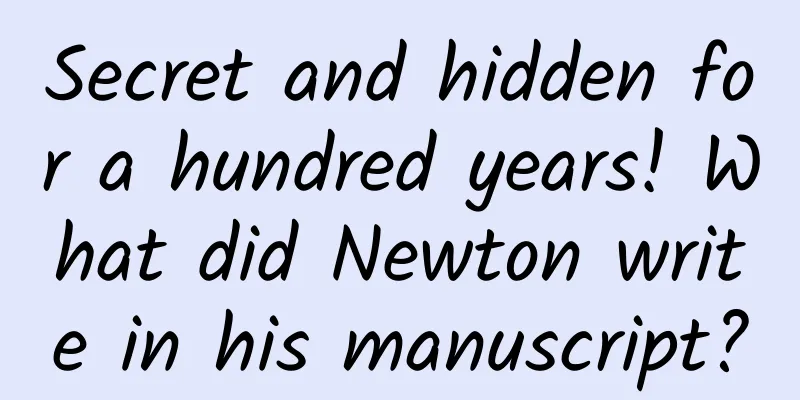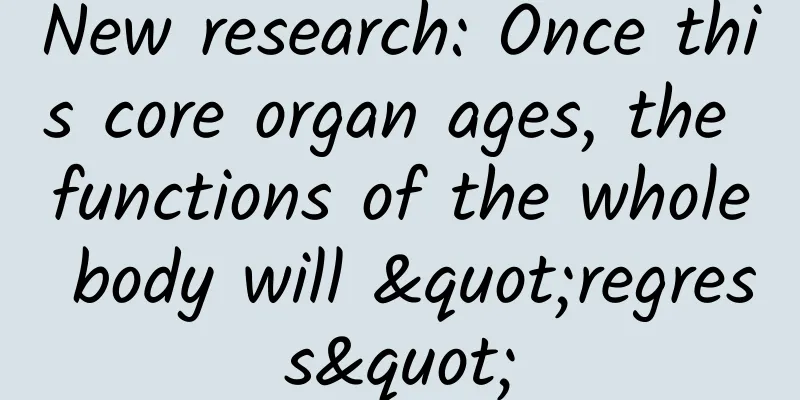Secret and hidden for a hundred years! What did Newton write in his manuscript?

|
Text|China Science Daily reporter Zhang Wenjing Isaac Newton died on March 20, 1727. He did not leave a will, but left behind a messy manuscript totaling more than 8 million words. What exactly was written in these manuscripts? Whose hands did they end up in? Why did the owners of the manuscripts keep the contents of the manuscripts secret for a long time? And who uncovered the secrets of the manuscripts and pieced together an unknown Newton? The recently published book "The History of Newton's Manuscripts Wandering" provides answers to these questions. The "heirs" of Newton's manuscripts Newton never married and had no children. After his death, except for five manuscripts that were published one after another, most of the other manuscripts were inherited by his niece Catherine and her husband John Conduit. Conduit was Newton's nephew-in-law, as well as his close friend and staunch supporter. Unlike other relatives who only cared about how much money they could make from publishing the manuscripts, the Conduits believed that these manuscripts were of great value and must be properly preserved. Conduit once planned to write a biography of Newton (which ultimately failed), so he interviewed Newton before his death and continued to collect anecdotes about Newton's life after his death. But he was unwilling to reveal a single word of the contents of the manuscripts, partly because the manuscripts were huge, scattered, and difficult to sort out, and more importantly, he wanted to protect Newton's personal reputation. Newton's personal reputation reached its zenith when he died. He was buried in Westminster Abbey and revered by his supporters as a pious scientific saint and a model of British rationality. However, a few years after his death, rumors began to circulate about the scientific giant's religious beliefs. The hints of his heretical ideas, which had already been revealed during his lifetime, became a topic of public discussion. At that time, if these speculations were confirmed, they would have a huge impact on Newton's reputation. What exactly was Newton's religious thought? These secrets are hidden in his manuscripts. In addition to the exploration notes on mechanics, mathematics, and optics, a large part of his manuscripts are about secret alchemical formulas and radical heretical ideas that reject the Trinity. Therefore, it is not difficult to understand why Conduit always kept these manuscripts in his home, away from the prying eyes of the outside world. It is also because of the concealment of the manuscripts that various speculations about Newton's religious thoughts ultimately failed to cause substantial damage to Newton's public image. In 1737 and 1739, Conduit and his wife died respectively. After that, Newton's manuscripts were handed over to the Portsmouth family who married their daughter. For more than 150 years, these manuscripts were quietly stored in the Hurstbourne Manor of the Portsmouth family. Except for the occasional hasty reading, there was no more disturbance. Does a "perfect monster" exist? Just as the manuscript was gathering dust in a noble manor, the outside world's debate about Newton himself intensified with the passage of time. In the 1720s, after the smoke of the Napoleonic Wars had dissipated, the British turned their attention to the Industrial Revolution, which was in full swing. As the role of science and technology in social progress became increasingly prominent, the emerging middle class began to pay attention to Newton, curious about his life and genius. In the 19th century, as more historical materials were revealed, people were surprised to find that Newton might have another face. Some people said that Newton had a mental disorder at the age of 55, and then became boring, mediocre in thought, and indulged in theological myths all day long. Others point out that Newton always targeted the astronomer John Flamsteed and was a sensitive, vindictive and even two-faced person. Naturally, some people came out to defend Newton's image. In 1833, at the third meeting of the British Association for the Advancement of Science, the term "scientist" was proposed to refer to those who were engaged in general scientific research. This was a new group with a common belief - to explore the laws of nature and put them into practice. At the same time, with the development of the industrial revolution, the previous idea of relying on individual efforts for scientific and technological progress has changed, and people have begun to believe that huge public investment in science is indispensable. Therefore, defending Newton's reputation is not only about the identity of the scientist group, but also about whether resources can be obtained for scientific development. These debates have not yet reached a conclusion, but in any case, the era of portraying Newton from a single perspective has completely ended. This has made people start to think about how to view the relationship between scientists and their scientific work. At that time, Augustus De Morgan, an early promoter of the history of science, argued that Newton's character and beliefs should be distinguished from his scientific achievements. In his opinion, many biographers want to portray Newton as a "perfect monster", but in fact, this "perfect monster" does not exist. "The Last Magician" Obviously, in the fierce debate of the 19th century, Newton's manuscripts did not play the role they should have. In 1872, the Portsmouth family decided to donate the scientific part of the manuscripts to Cambridge University. Cambridge University invited four scholars to sort out the manuscripts, and the cataloging and cutting of the manuscripts was finally completed in 1888. Since then, the manuscripts have remained quietly stored in the warehouse, with no one paying attention to them. In 1936, the Portsmouth family handed over the non-scientific manuscript to Sotheby's auction house for auction. The auction attracted many buyers, including the famous economist John Maynard Keynes. Keynes was particularly interested in the manuscripts on alchemy, which, in his opinion, could completely revise people's understanding of Newton. He believed that Newton's worldview was not dominated by rational science, but rather a more ancient worldview, that is, the world is a unified entity that is interconnected. This led to his famous saying, "Newton was not the first person in the Age of Reason." He is the last of the magicians... He sees the visible and intellectual worlds in the same way as his predecessors who have contributed to the human intellectual heritage for thousands of years." As for the old topic of Newton's mental state, Keynes was convinced that Newton's theological and alchemical beliefs came from a mentally normal person, and that the manuscripts showed "rigorous knowledge, accurate methods, and extremely calm statements" and were completed before Newton entered his old age or possible mental disorder. This auction caused Newton's manuscripts to be scattered all over the world. Since the 1950s, with the rise and development of the history of science, the study of Newton's manuscripts has really been on the right track. "In 1872, when Newton's manuscripts were first brought to Cambridge University, people thought it was simple, thinking that since this was a physicist, mathematician, chemist and paleographer, he would be able to sort out the manuscripts quickly. But it took 16 years. People then realized that manuscript research is a very complicated task, and interpreting them requires experts in related disciplines. This is the call for the discipline of history of science." In an interview with China Science Daily, Wang Zheran, the translator of the book and assistant professor of the Department of History of Science at Tsinghua University, pointed out the importance of manuscript research. Further reading It’s not a serious academic job, and manuscript editing is just physical labor? Driven by the development of the history of science, Newton research has become popular and even called the "Newton industry." Many Newton anthologies based on his manuscripts have been published. Many scholars have tried to reveal different aspects of Newton from the manuscripts based on their personal preferences. Some believe that Newton created a unique "Newtonian" style of thought, emphasizing the repeated verification of mathematical models in the physical world; some point out that Newton was an alchemist who believed that the earth was a living, breathing organism; others explore Newton's emotional relationships from a psychological perspective. There are also scholars who are unwilling to transform or deconstruct Newton's image, and are merely satisfied with using new manuscript materials to explore issues at the level of scientific methods. But in the view of Sarah Dery, a science historian and author of "The Lost History of Newton's Manuscripts," these studies still attempt to simplify Newton and forget that the manuscripts contain more open and diverse possibilities. Dery believes that the loose and mottled manuscripts and the repeatedly revised handwriting, rather than revealing the foundation of Newton's philosophical construction or describing his rational thinking process, reflect his "never-ending" state of mind. The phrase “Never Resting” comes from a letter of Newton, and later became the title of the most authoritative biography of Newton’s science to date. “The search for truth and unity in that restless mind is indeed difficult to satisfy if it can be easily explained,” Dery wrote in the book, and the manuscripts are “not the narrative of a single fact, but the narrative of a large number of facts intertwined with each other.” "This also reflects the value of manuscript research," Wang Zheran said. "It provides the most basic materials for many studies and also provides unpredictable possibilities." Wang Zheran's own research is closely related to the manuscripts. Much of his doctoral dissertation, "The Origin and Development of Renaissance Perspective," and his subsequent research on the restoration of scientific instruments and technological inventions, was based on his research on Leonardo da Vinci's manuscripts. "The reason why I can do this research is thanks to an Italian project to digitize Leonardo da Vinci's manuscripts. Manuscript research is an academic work with a long-tail effect that can benefit the entire academic community. A manuscript organizer cannot predict who his or her work will help or what academic results it will produce," said Wang Zheran. However, compared with its research value, the most basic manuscript sorting work is in the embarrassing situation of being "thankless". "Even in the West, research institutions encourage innovative results. Manuscript editing is generally considered to be a relatively manual job, and academic achievements are evaluated relatively low, or even not considered as serious academic work." Wang Zheran said, "This is also a reminder for our academic community. Now we need to vigorously develop basic research, so should the basic work in basic research also be supported?" In Wang Zheran's view, this kind of basic work is very helpful for talent cultivation. "A researcher who is good at basic work may not publish many papers, but his knowledge reserve and academic foundation are often very deep, and he is good at teaching professional courses and guiding students. If everyone follows trends and hot topics and ignores these basic academic work, in the long run, academic research will become increasingly superficial and cause great problems. " China Science Daily (2022-04-15, 3rd edition, original title: Newton's Manuscript Drifting) Editor | Zhao Lu Typesetting | Zhihai |
<<: Only these five types of masks can prevent epidemics!
>>: Attention, tourists! Our next stop is Lung Lobe!
Recommend
From online self-made to film company video websites are getting bigger and bigger
After the dispute over copyright content, online ...
How to transfer files between iPhone 12 and Windows without using apps
[[408549]] For Apple users, in daily work, they o...
The mortgage interest rate will be re-signed starting today, here are the details of the 2020 mortgage interest rate re-signing!
Starting from today (March 1st), there will be an...
How do popular products come about? Ideas for selecting products for second-category e-commerce advertising!
You place orders as aggressively as a tiger, but ...
Ball lightning caused an explosion in the workshop, lightning protection safety should be paid attention to
Ball thunder? What is ball thunder? ▼▼▼ Ball Ligh...
How long does it take for eating dog meat to be effective in improving sexual performance?
Q: How long does it take for eating dog meat to b...
Yangquan Course Mini Program Agent Price Query, How much is the Yangquan Course Mini Program Agent Price?
How much does it cost to be an agent for a course...
Xiaohongshu promotion: 5 strategies for promoting Xiaohongshu
Xiaohongshu was founded on June 6, 2013. It was i...
[Smart Farmers] Wild carp are also endangered! Wild forms of aquatic species are under threat
Editor’s Note: The report of the 20th CPC Nationa...
Travel Tips for May Day! A quick overview of the latest epidemic prevention policies in various places
The May Day holiday is coming soon, and many peop...
How much does it cost to make an entertainment app in Ningde?
Mini programs provide convenience for publicity a...
4 keywords to ignite social media marketing, everything you don’t know is here!
During our practice, we found that many companies...
Zhang Peichao's 30 Lectures on Modern Schizophrenia
Zhang Peichao's 30 Lectures on Modern Schizop...
What are children learning in their long childhood? How should they learn?
Cognitive control is not a mental function, but r...
It is rare to see 51% alcohol liquor on the table. Chemists: Because it tastes a bit strange
In 1153, the Jin Dynasty moved its capital from S...


![[Body Wandering] Why do we work so hard but still get nothing?](/upload/images/67f1cf120b539.webp)






